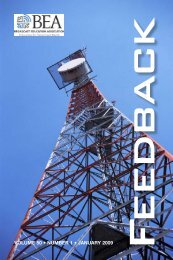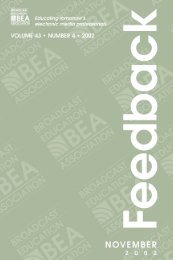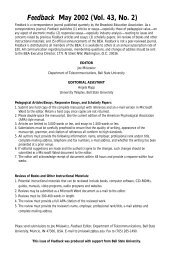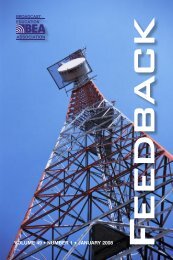PLANNING FOR GROWTH IN YEARS OF RESTRICTED RESOURCES
Feedback September 2003 - Broadcast Education Association
Feedback September 2003 - Broadcast Education Association
You also want an ePaper? Increase the reach of your titles
YUMPU automatically turns print PDFs into web optimized ePapers that Google loves.
ESSAY‘BIG’ ISN’T ‘BAD’Bob Wright, Chairman & CEO of NBC,Vice Chairman, GEThis article originally appeared in The Wall Street Journal, July 23, 2003.It is reprinted here with permission.Unfortunately, the public discourse on important issues sometimes becomesuntethered from fact and reason.Such is the case with the response to the FCC’s expansion of the national televisionstation ownership cap, which would allow a single entity to own stations that have apotential reach of 45% rather than 35% of the national TV audience.Rep. David Obey (D-Wis.) expressed the sentiments of many recently when he said:“I don’t want ownership factors to get in the way of districts like mine from being ableto have their own cultural attitudes.” But the FCC’s modest adjustment of ownershiprules does not mean the silencing of local voices under the weight of monolithic mediacompanies. On the contrary, the record shows that local voices, as measured by theamount and quality of local news and public-affairs programming, increase whennetworks such as NBC take operating control of television stations.Views such as Rep. Obey’s reflect a politically convenient populism that equates “big”with “bad.” There are a number of mistaken assumptions at work here: 1) that thecorporate parent of a broadcast station dictates its point of view or “cultural attitude”;2) that the alternative to a station’s being owned by a broadcast network is ownershipby a mom-and-pop enterprise with offices above the five-and-dime on Main Street; 3)that such a small owner is better able to present a distinctive “voice” in the communitythan is a large media company.In fact, the location of a media company’s home offices has nothing to do with its“voice.” Station owners are in the business of appealing to their local audiences. Theydo that by serving their communities the best way they know how. In NBC’s case, thismeans providing a local station with superior newsgathering and technical resourcesthat enable it to enhance and extend its local programming. This is good for thecommunity, and it is good business. A smaller owner, with more limited resources, is alltoo often forced to jettison expensive local news coverage in favor of less expensiveprogramming imported from national syndicators.Moreover, if a broadcast network is prohibited from owning a station in a desirablemarket, the owner is unlikely to be a small, locally based company. It will instead be alarge, diversified media company like Belo, Gannett, Hearst-Argyle, Scripps, or theWashington Post. It defies logic to claim that, in the name of “localism,” the $6 billionGannett Co., the Arlington-based owner of 100 daily newspapers and 22 televisionstations, should have freedom to expand its TV stations business but NBC, ABC, CBS,and Fox should not.63Feedback September 2003 (Vol. 44, No. 4)
















